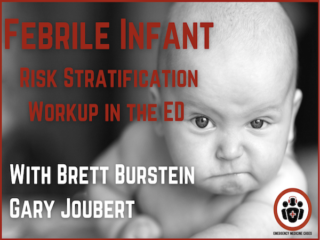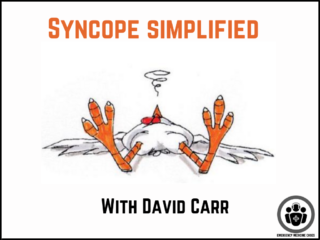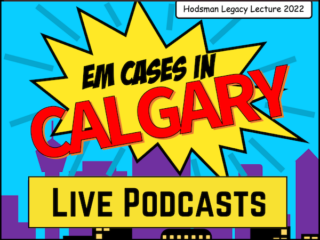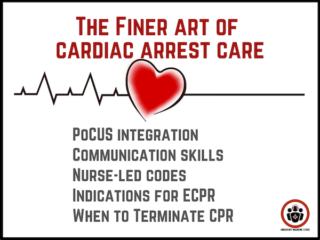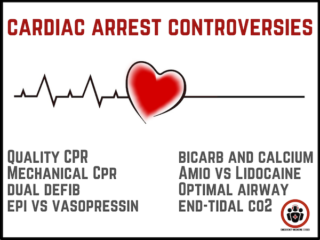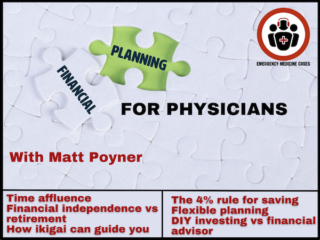
Ep 173 Febrile Infant – Risk Stratification and Workup
In this main episode podcast on ED risk stratification and workup of the febrile infant, recorded at the CAEP 2022 Conference in Quebec City with Dr. Brett Burstein and Dr. Gary Joubert, we answer such questions as: Which febrile infants require lumbar puncture? How accurate is procalcitonin in identifying low risk febrile infants? What is the difference between serious bacterial infection (SBI) and invasive bacterial infection (IBI) and why is this important in the work up of the febrile infant? How do the PECARN, Step-by-Step and Aronson decision tools for identifying febrile infants at low risk for IBI and SBI? Can EM Cases incorporate all these decision tools and the upcoming Canadian Pediatric Society position statement on febrile infants recommendations into one concise algorithm? and many more...
Ep 172 Syncope Simplified with David Carr
In this main episode podcast, Dr. David Carr joins Anton to give us his simplified approach to syncope based solely on history, physical and ECG to help guide disposition decisions. We answer questions such as: What features have the best likelihood ratios to help distinguish syncope from seizure? What key clinical features on history and physical exam can help us distinguish orthostatic and reflex syncope from the more sinister cardiac syncope? What is the best approach to ECG interpretation for the patient who has presents with syncope? Are syncope clinical decision tools any better than physician gestalt? and many more.... Please support EM Cases by giving a donation: https://emergencymedicinecases.com/donation/
Ep 171 Posterior Stroke, EP Lead, HEAR Score, Ketamine for Suicidal Ideation, Peer Support Workers – Highlights from Calgary EM Hodsman Lecture Day
In this special edition main EM Cases podcast episode we feature the highlights from live podcasts recorded at Calgary EM during their annual Hodsman Lecture Day, covering a variety of current EM topics: The challenges of posterior circulation stroke (PCIS); Emergency Physician Lead to improve ED overcrowding, access block and job satisfaction; When not to order a troponin - The HEAR Score; Ketamine to relieve suicidal ideation and reduce acute risk; Peer Support Workers for ED patients with mental health issues and substance use disorder, plus a description of the Pathway to Peers program...
Ep 170 Cardiac Arrest – PoCUS Integration, Communication Strategies, E-CPR, Calling the Code
In this part 2 of our 2-part podcast series on Cardiac Arrest - The When, Why & How, we discuss some of the finer art of cardiac arrest care and answer questions such as: how should we best communicate to EMS, the ED team and the family of the patient to keep the team focused, garner the most important info and keep the flow of the code going? How should we integrate PoCUS into cardiac arrest care so we do not interrupt the core components, yet we gain valuable data? What are the indications for consideration of ECPR/ECMO in cardiac arrest? What factors need to be taken into consideration to decide on when to terminate resuscitation of the cardiac arrest patient - when to call the code? and many more...
Ep 169 Cardiac Arrest Controversies – Chest Compressions, Dual Defibrillation, Medications and Airway
In this first part of our 2-part series on Cardiac Arrest Controversies Rob Simard, Bourke Tillman, Sara Gray and Scott Weingart discuss with Anton how best to ensure high quality chest compressions, the pros and cons of mechanical CPR, the literature on dual sequential defibrillation and optimizing pad placement, epinephrine vs vasopressin, amiodarone vs lidocaine, when to consider IV calcium and sodium bicarbonate, esmolol, airway considerations, sedation in cardiac arrest, the pros and cons of end-tidal CO2 and more...
Ep 168 Financial Planning for Emergency Physicians
In this episode we discuss how to earn, spend, save and invest wisely and answer questions such as: What is time affluence and how should it guide our financial planning? Why should our goal be financial independence rather than retirement? What are the 4 evidence-based cornerstones for financial planning for happiness? What is the 4% rule for figuring out how much money one needs to be happy? How should we approach spending in a way that is sound? When should we start saving and how much should we save through our careers? What is more important: how much we save or our investment returns? How much do you need to be financially independent or retire? What are the first steps of financial planning? What are the advantages and disadvantages of having a financial advisor vs DIY financial planning? What are the biggest risks for investors? What are the first steps to becoming a DIY investor and many more...

